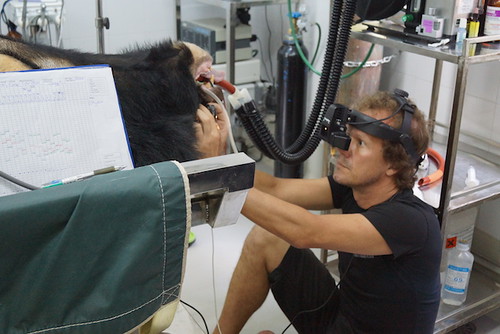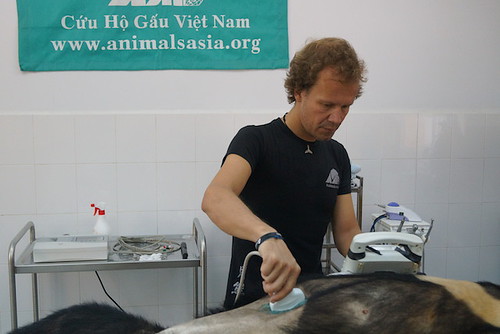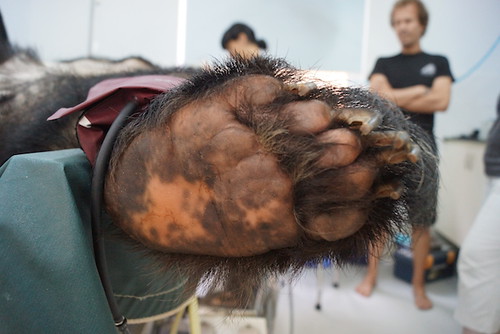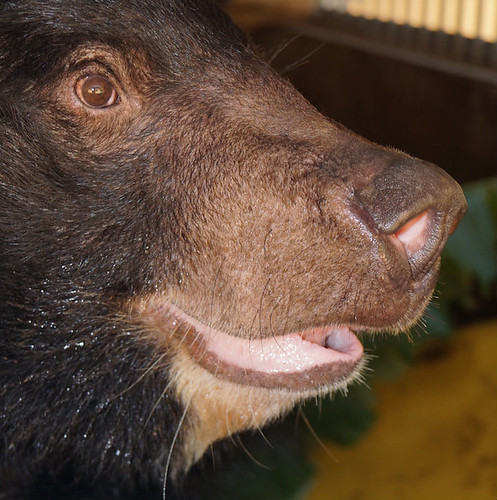Vet team heartened by Ti Map health check
17 July 2014
Ti Map, the last bile-farmed moon bear in Vietnam’s Binh Thuan province following his rescue by Animals Asia earlier in the year, has heartened vets after no significant health issues were found during his health check.
Vets initially feared for Ti Map – whose name means “Chubby Mouse” – when he reacted badly to a routine dose of light anesthetic during his rescue.
At the time, Senior Vet Joost Philippa took the decision to abandon the health check after Ti Map twice stopped breathing – having to be revived by Joost’s quick thinking and experience.
Since then, the team has patiently waited for the arrival of anesthesiologist Dr. Gudrun Schoeffmann in order to conduct a health check on Ti Map in search of underlying health issues that may have caused the reaction.
Dr. Schoeffmann is a veterinary anesthesia specialist, originally from Austria, who has been working and teaching at the Royal (Dick) School of Veterinary Medicine in Edinburgh for the past seven years.
During her visit to Animals Asia’s Vietnam and Chengdu sanctuaries she held workshops, education sessions and helped to monitor our existing anesthetic protocols and techniques as part of our continuous updating process.
Dr Gudrun Schoeffmann said:
"Together with the vet team at VBRC we analysed what happened during Ti Map's first anaesthetic. […] this unusual response was likely due to underlying health problems, together with an individual response to anaesthetic agents, which varies from bear to bear. After a briefing session with all the staff involved in his anaesthetic, Ti Map was anaesthetised successfully and received a full health check.
Animals Asia Senior Veterinarian Joost Philippa said:
“As expected, again Ti Map reacted very strongly to the anaesthetic drugs entering a deep plane of anaesthesia much faster than is typical for moon bears. Throughout the health check we tried to keep him under light anaesthesia, and monitored him very carefully, to minimise any risk. Bile farmed bears typically have severe issues with their gallbladders, and sure enough, Ti Map’s was thick-walled – a chronic reaction to 14 years of bear bile extraction. In the future it may be necessary to remove the gall bladder, but for now we will wait until Ti Map’s next health check to ascertain any changes in his situation.”
“Thankfully, the rest of Ti Map’s health check revealed no major abnormalities apart from some abnormal blood values which we will continue to monitor.”
Following the health check, sanctuary staff are cautiously optimistic that Ti Map can move on to the next stage of his long rehabilitation process.
Bear and Vet Team Director Annemarie Weegenaar said:
“Having got over this first hurdle, we can start to look cautiously at integrating Ti Map with other bears within his house and eventually move to an outdoor enclosure. It’s a process we won’t rush. Having been in a small cage for 14 years suffering bile extraction Ti Map’s integration with other bears and eventually larger spaces will be handled slowly. Only when we’re sure Ti Map is ready will we begin to take the next steps.”
BACK








 Healing the hidden wounds
Healing the hidden wounds
 Early summer awakening at the China Bear Rescue Centre
Early summer awakening at the China Bear Rescue Centre
 5 reasons the dog meat trade must end
5 reasons the dog meat trade must end